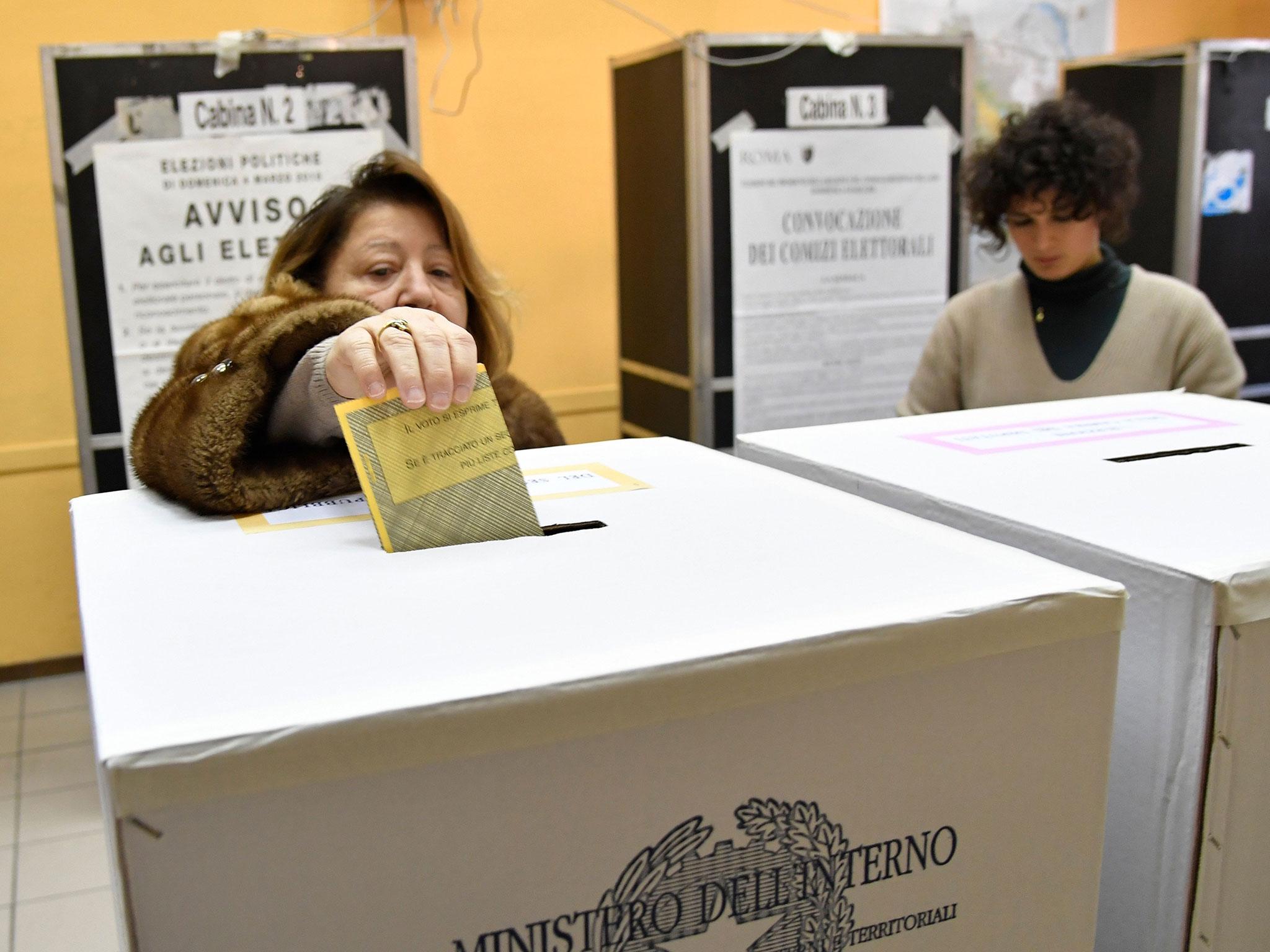Italy election: When do polls open, who are the main parties, and will Berlusconi return to centre-stage?
Voting has begun across the country, with polls closing late tonight

Your support helps us to tell the story
From reproductive rights to climate change to Big Tech, The Independent is on the ground when the story is developing. Whether it's investigating the financials of Elon Musk's pro-Trump PAC or producing our latest documentary, 'The A Word', which shines a light on the American women fighting for reproductive rights, we know how important it is to parse out the facts from the messaging.
At such a critical moment in US history, we need reporters on the ground. Your donation allows us to keep sending journalists to speak to both sides of the story.
The Independent is trusted by Americans across the entire political spectrum. And unlike many other quality news outlets, we choose not to lock Americans out of our reporting and analysis with paywalls. We believe quality journalism should be available to everyone, paid for by those who can afford it.
Your support makes all the difference.Instability risks being the real winner of Sunday's general election in Italy. An explosive mix of political turmoil, voter indecision and procedural complications is likely to leave the eurozone’s third-largest economy weakened by the time the dust has settled and the result announced.
Most polls opened at 7am local time (6am GMT) and Italians have started registering their votes, although there were some administrative hiccups. Some polling stations remained closed in Palermo hours into election day because the wrong ballots were delivered and 200,000 new ones had to be reprinted overnight.
Booths will close at 11pm, with exit polls expected on the hour and then projected results some time after that. But the latest opinion polls before Sunday's vote suggested there is no guarantee that the long day will produce an overwhelming victory for any party.
Three main groupings outside the political mainstream are competing for a grip on power: extreme-right Eurosceptic populist parties such as Matteo Salvini’s Northern League and Giorgia Meloni’s Italian Brothers; the anti-establishment Five Star Movement led by 31-year-old Luigi Di Maio; and the revival of openly fascist parties such as Forza Nuova and CasaPound. Paradoxically, the result of this split could be the return to political life of the old TV tycoon and EU-friendly moderate Silvio Berlusconi.
And to make matters more confusing, the new electoral system is partly first-past-the post and partly proportional, and doesn’t provide any majority bonus prize to the biggest party. It leaves a fragmented outcome almost inevitable.
Opinion polls may not predict a final overwhelming winner, but they all agree the most likely loser to be the left wing. Paolo Gentiloni, Prime Minister of the incumbent caretaker government, is the frontrunner of a centre-left coalition together with Matteo Renzi, leader of the Democratic Party, who himself served as Prime Minister before a disastrous attempt at constitutional reform failed in a referendum and led to his resignation.
Despite Italy’s slow economic recovery and DP’s stunning victory at the European elections in 2014, Renzi’s pro-EU party is beset by division and decline, with a new left-wing party “Leu” (Liberi e Uguali, Free and Equal) opting to split away. Surveys suggest that DP’s electoral support has decreased to the point that the centre left is rated to be the least popular coalition, with about 24-26 per cent of the vote.
So who is going to win? “No one ever trusts polls to be prophetic, and neither do I”, said Ilvo Diamanti, a leading Italian polling expert and professor of political science at the University of Urbino.
“A key factor is voters’ indecision. A few hours before the vote, a large number of eligible voters – about 15 per cent – still don’t know if they will express their disillusion by abstaining or through a protest vote. If they choose to protest, then the anti-establishment Five Star Movement will take advantage of dissatisfaction.” The Eurosceptic, anti-immigrant 5SM is rated to be the single biggest party, with about 28 per cent. This doesn’t give it a majority for governing, but it also isn’t good news for Brussels: EU officials would likely prefer to see victory for a moderate centre-left/centre-right “grosse coalition”.
And that’s where Silvio comes in: despite being banned from office over a corruption conviction, Berlusconi turns out to be a crucial player again. His centre-right coalition is likely to win the most votes, the latest polls suggest. That means his Forza Italia, despite polling at around 16 per cent, could effectively lead the country with the “Cavaliere” of Italian politics as party president and his pick – European Parliament President Antonio Tajani - as prime minister.
Something entirely different will happen if the extreme right gets more votes. With Salvini’s Northern League polling at 13 per cent and the eastern European-leaning Italian Brothers on 5 per cent, an anti-immigrant sentiment and a harsh Eurosceptic attitude could end up playing an effective role.
But there’s a good chance that no one will gain an absolute majority. On Monday, there will be a final result; but the scenario could be clarified only weeks later. It will then fall to President Sergio Mattarella to pick a figure for exploratory talks. Tricky negotiations will inevitably follow.
Join our commenting forum
Join thought-provoking conversations, follow other Independent readers and see their replies
Comments